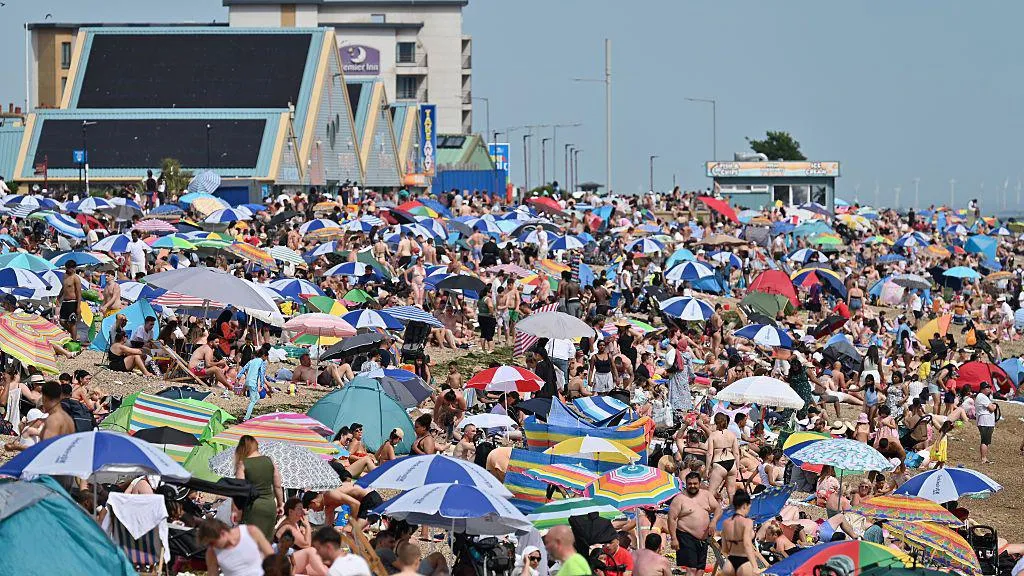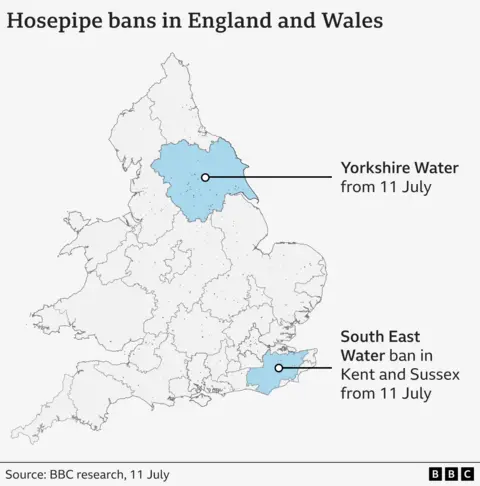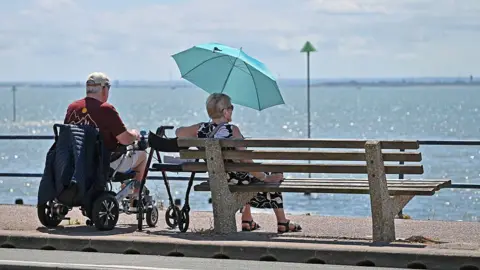
 Getty Images
Getty ImagesHeat health alerts have been upgraded to amber for southern England, the Midlands and East of England as the third heatwave of the summer grips the UK.
The warnings came into force on Friday and will remain in place until Monday morning, the UK Health Security Agency said. Less severe yellow warnings remain in place for northern England.
Astwood Bank in the West Midlands recorded the highest temperature of 34.7C by 18:00 BST on Friday while Wales saw its hottest day of the year when the mercury reached 32.7C in Usk.
More than seven million people have had hosepipe bans imposed on them due to low water levels across England.
A hosepipe ban could include restrictions on certain activities like watering gardens, washing cars, or filling up paddling pools, and people who break the ban could face a fine.
The Environment Agency has declared a drought in north-west England and Yorkshire after record-low levels of rain.
On Monday, South East Water confirmed it would impose water usage restrictions on much of Kent and Sussex, and said it would "monitor the situation" in parts of Surrey, Hampshire and Berkshire.

Hosepipe bans were already in place in Yorkshire, and parts of Derbyshire and Lincolnshire.
The weather alert service warns the public in England when high or low temperatures could damage their health or lead to disruption to critical public services.
Glasgow's TRNSMT Festival and London's Wireless Festival warned festival-goers to stay hydrated and wear sun cream, while Oasis has told fans to "prepare for extreme sun and heat" at their Heaton Park gigs in Manchester on Friday and Saturday.
NHS urgent care doctor Lorna Powell told the BBC that people with existing health conditions were more likely to suffer during a heatwave.
She said when someone has a health condition like a weak heart, kidney problems, or diabetes, an "extra load such as extreme heat can just deplete the body to the extent it can't control that condition anymore".
The NHS has advised that during a heatwave, people should keep out of the heat where possible, stay in the shade when outside, have cold food and drinks, wear light clothes, and close windows during the day and open them at night.
 Getty Images
Getty ImagesThe Scottish Fire and Rescue Service issued an extreme wildfire warning covering central and eastern Scotland on Friday, which will be extended to "all areas, except low-lying areas with green grass" from Saturday to Monday.
Leigh Hamilton, a ranger service manager at Loch Lomond National Park Authority, advised people to "avoid naked flames including disposable barbecues, dispose of waste properly, and call 999 immediately if you witness a wildfire".
In Northern Ireland, the Natural Hazards Partnership issued an amber warning, which indicates a likelihood of difficult-to-control wildfires, for Saturday and Sunday.
 PA Media
PA MediaMany parts of the UK recorded temperatures above 30C on Friday. By 18:00 BST, Scotland's highest recorded temperature was 28.9C in Aboyne, west of Aberdeen, while Magilligan in Northern Ireland experienced highs of 28.1C.
The heat will continue into Saturday, when temperature may reach 31C in parts of central and north-east Scotland, making it the hottest day of the year so far north of the border.
Sunday is set to be cooler as a north-easterly breeze sets in, though temperatures will still be in the high twenties and low thirties for many.
There is also a chance of a few showers across some eastern areas of England.
The heatwave will be over for most on Monday as cooler Atlantic air spreads, bringing cloud and some showers to northern and western areas.
The heat spreading across the UK marks the third official heatwave of 2025 already.
Scientists warn that extreme weather conditions are made more likely as a result of manmade climate change.
Additional reporting by Hollie Cole and Malu Cursino